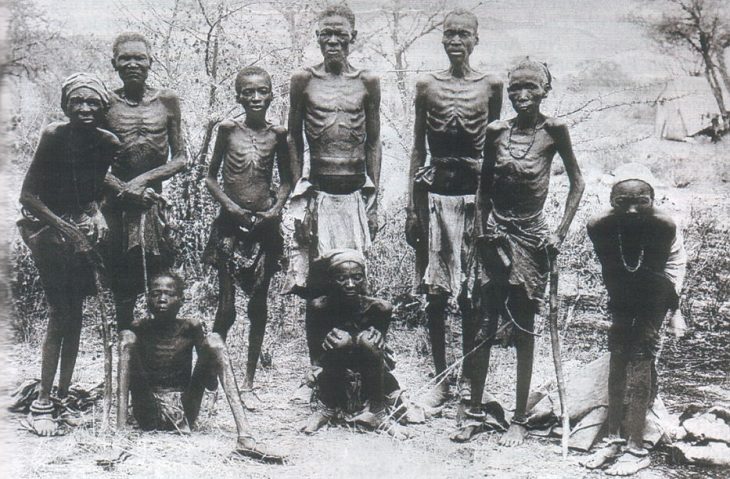A century after losing its South-West Africa colony, now Namibia, Germany is debating how to close one of the darkest chapters of its colonial period: the extermination of over 80% of Hereros, which was the first genocide of the 20th century.
Anyone going to the Namibian capital Windhoek a few decades ago would find themselves on Kaiser Avenue or Heinrich Goeringstrasse, another of the city’s main streets named after the first High Commissioner who headed this German colony from 1885 to 1900. Namibia gained independence in 1990, but one of the darkest parts of German colonial history has remained little known to the public at large, even if familiar to historians and of course the survivors’ descendants.
Between 1904 and 1908, two rebel groups – the Hereros and Namas – were more than 80% exterminated by German soldiers. This was the first genocide of the 20th century, even if the term did not yet exist (it was invented in 1943). Some 100,000 Hereros and 10,000 Namas died because they opposed the grabbing of their land by German settlers looking for Lebensraum, or “vital space”. General Lotha von Trotha, who commanded the German troops, wrote the extermination order in 1904: “I believe that the nation as such should be annihilated, or, if this is not possible by tactical measures, expelled from the country”. An order he issued the same year stated: “Any Herero found within the German border, with or without a rifle, with or without cattle, is to be shot. I do not accept women or children either: drive them back to their people or shoot them”.
Some historians have made a link between the “Kaiser’s Holocaust” and the one committed by Hitler’s Germany, since both were driven by an ideology of eugenics and racial purity. The total impunity enjoyed by General Lotha von Trotha after committing mass crimes no doubt reassured the Nazis that they would not be punished for exterminating other populations. Von Trotha put Hereros in concentration camps, following the example of the British who brought in this type of detention during the second Boer War (1899-1902).
“You cannot rewind time”
A century after Germany lost its African colonies, it recognized officially for the first time in July 2015 that von Trotha’s soldiers had committed a “genocide”. This recognition was partly due to the activism of some descendants of the Hereros and Namas, who had sent a delegation to Berlin and threatened to go to a court of arbitration if their demands were not met, namely recognition of the genocide, official apologies, repatriation of human remains stolen for pseudo-scientific purposes and finally negotiations with the German authorities on reparations.
Since then, the German and Namibian authorities have been negotiating a joint statement but have clashed over use of the word “reparations”, which Namibia wants but Germany does not. Berlin considers that the crime of genocide was only recognized under the international Convention of 1948 and therefore does not apply retroactively. German special envoy Ruprecht Polenz wants to avoid unleashing a flood of reparation demands for crimes committed long ago. “You cannot restart history,” he says. “You cannot rewind time, not in your private life, not in public life.” Germany has nevertheless signalled that it will grant development aid.
The fact that closure is still being negotiated more than a century after the crimes were committed can be explained by the fact that from 1915 up to independence in 1990, Namibia was ruled by the white, apartheid regime in South Africa, which had no interest in talking about the massacres of Hereros and Namas. Britain had documented them as early as 1918 in a parliamentary report known as the blue book, but had never made it public because the German government threatened to retaliate by revealing colonial atrocities committed by British soldiers. After independence it was the majority ethnic group, the Ovambos, who ruled Namibia and until recently paid little heed to demands from the descendants of Hereros and Namas that the suffering of their people in the early 20th century be recognized.
But the doubts of Hereros and Namas remain about the Namibian government’s ability to protect their interests. On January 5, 2017, groups of Hereros and Namas filed a class action suit in the United States demanding that their representatives be included in negotiations between Germany and Namibia. They want to ensure that their rights as an indigenous ethnic minority are protected and that they obtain “reparations” for the genocide committed by the Second Reich between 1904 and 1908.





